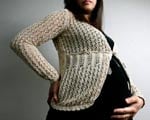Young mothers tend to be heavier than their peers who don't have children, and they also consume more saturated fat, sugary beverages and total calories.

Becoming a parent is a common life event in early adulthood, but little is known about the connection between parenthood and weight-related health. Understanding parents' health behaviours is important, because health habits may be perpetuated into adulthood and transmitted to children.
Examining data from Project EAT (Eating and Activity in Teens and Young Adults), researchers from Minnesota focused on the link between parental status, dietary intake, physical activity and body mass index (BMI) in 838 women and 682 men with an average age of 25. Project EAT, a longitudinal population study, followed young participants through three age points between 1998 and 2009, as they progressed into young adulthood. Participants who became parents between the second and third follow-ups and had a child aged 5 or younger formed the parent group in the study.
Height and weight were self-reported, while a food-frequency questionnaire was used to assess the typical intake of such foods as fruit, dark green and orange vegetables, milk products and sugar-sweetened beverages over the prior year. Young adults were also asked how many hours in a usual week they spent doing activities ranging from jogging or rollerblading to biking, skiing, dancing or bowling.
Results showed that although much dietary behaviour were the same between parents and non-parents, mothers reported greater consumption of sugar-sweetened beverages, total energy, and percent saturated fat. But despite their greater intake of fat, sugar and calories, the young mothers also consumed as much fruit, dairy, whole grains and calcium as non-mothers. While fathers were no heavier than their non-parenting peers, mothers had significantly higher BMIs compared with women without children, and both mothers and fathers exercised less frequently.
The researchers felt that these findings may suggest that mothers have conflicting factors that influence their dietary intake outcomes. Taking primary responsibility to feed, nurture, and provide overall care for the children may put mothers at increased risk for weight gain and poorer dietary intake because they have less time for physical activity, eat more of the palatable foods children prefer (high in saturated fat and calories), and have more interrupted sleep patterns (responsible for night feeding or wakeups). Possible explanations for lower physical activity levels among parents versus nonparents is that parents may have difficulty finding time to engage in physical activity. Many parents find caring for young children to be physically and emotionally demanding, and therefore may either not be able to find the time to exercise or, if they have time, they are often too tired to do so.
These ?ndings of this study suggest that health care providers may want to consider discussing dietary intake and physical activity with new parents to identify ways to engage in healthful behaviours given the daily demands of parenthood, both to improve parents' own health and to help them model healthful behavior for their children.
DoctorNDTV is the one stop site for all your health needs providing the most credible health information, health news and tips with expert advice on healthy living, diet plans, informative videos etc. You can get the most relevant and accurate info you need about health problems like diabetes, cancer, pregnancy, HIV and AIDS, weight loss and many other lifestyle diseases. We have a panel of over 350 experts who help us develop content by giving their valuable inputs and bringing to us the latest in the world of healthcare.












